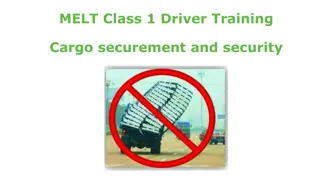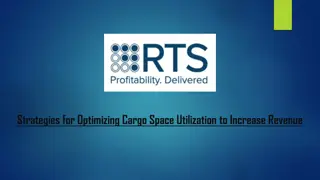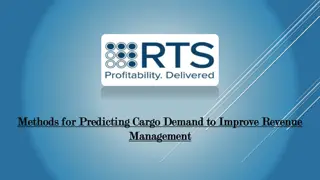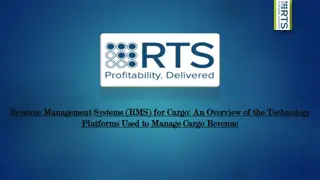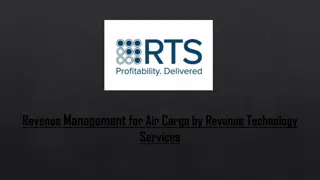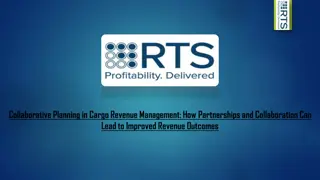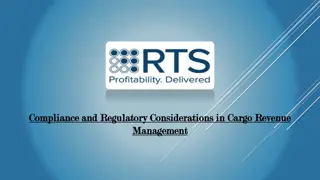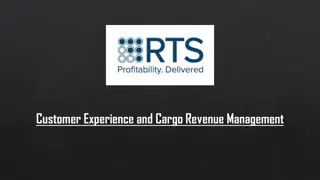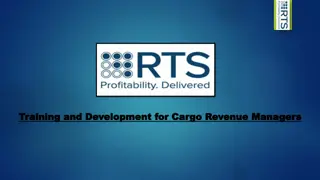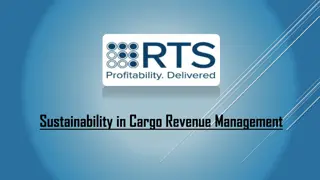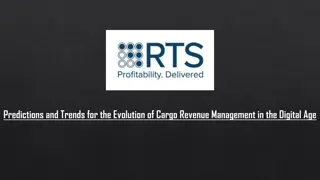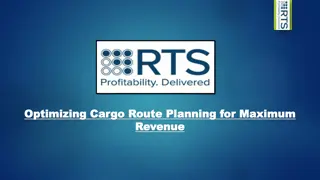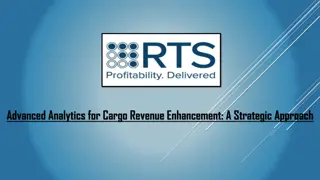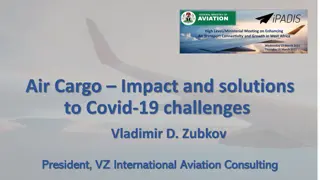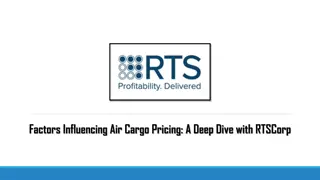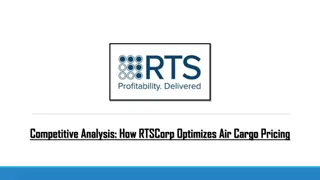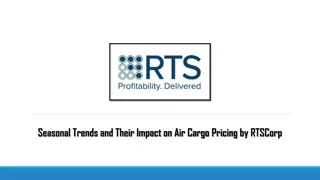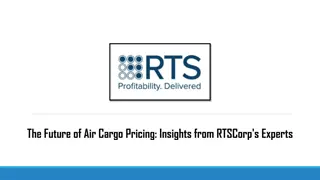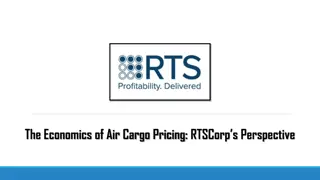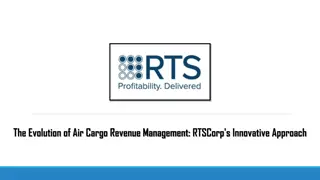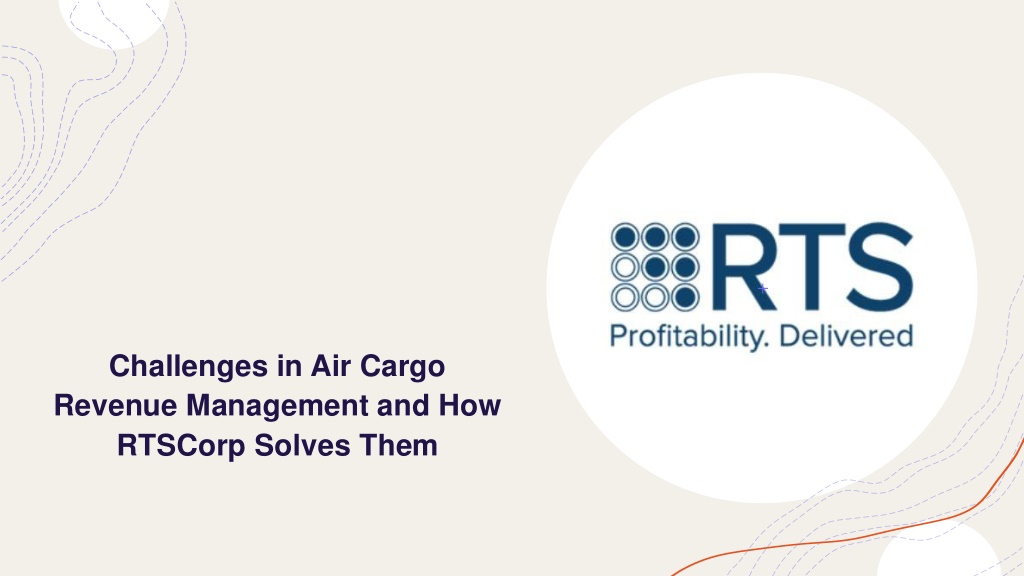
Challenges in Air Cargo Revenue Management and How RTSCorp Solves Them
Air cargo revenue management is a complex and dynamic field that requires a strategic approach to maximize revenue while balancing capacity, pricing, and customer satisfaction. The industry has faced many challenges, especially with the rise of e-com
Download Presentation

Please find below an Image/Link to download the presentation.
The content on the website is provided AS IS for your information and personal use only. It may not be sold, licensed, or shared on other websites without obtaining consent from the author. Download presentation by click this link. If you encounter any issues during the download, it is possible that the publisher has removed the file from their server.
E N D
Presentation Transcript
Challenges in Air Cargo Revenue Management and How RTSCorp Solves Them
+ Air cargo revenue management is a complex and dynamic field that requires a strategic approach to maximize revenue while balancing capacity, pricing, and customer satisfaction. The industry has faced many challenges, especially with the rise of e-commerce, fluctuating demand, and the unique operational requirements that air freight entails. RTSCorp, a leader in this domain, offers solutions that address the major obstacles in air cargo revenue management, providing streamlined, data-driven tools to enhance profitability and operational efficiency. Below, we explore the primary challenges in air cargo revenue management and how RTSCorp is solving them. + 1. Demand Forecasting and Market Volatility + Demand forecasting in air cargo is challenging due to the highly volatile nature of the industry. Demand can vary drastically depending on seasonality, economic factors, and sudden global events. The unpredictability of events like the COVID-19 pandemic only underscored this challenge, leading to increased demand for cargo space while also limiting the availability of certain routes and capacities. + RTSCorp addresses this challenge through advanced demand forecasting tools that use machine learning to predict shifts in demand accurately. By analyzing historical data and market trends, RTSCorp s solutions enable airlines to adjust their capacity and pricing strategies in real time. This allows for better planning and resource allocation, even in volatile market conditions, ultimately maximizing revenue opportunities.
+ 2. Capacity Management + Optimizing capacity is another critical element of air cargo revenue management. Air cargo operations involve limited space and weight restrictions, and unused capacity leads to revenue loss. However, overbooking can also be detrimental if it results in cargo delays, dissatisfied customers, or additional handling costs. + RTSCorp s capacity management solutions provide intelligent allocation tools that allow for flexible, data-informed decision-making. By analyzing capacity requirements based on route, cargo type, and demand forecasts, RTSCorp helps carriers minimize empty space while avoiding overbooked flights. Their platform integrates with airline operations, making it easier to adjust flight schedules and capacities in real time to adapt to last-minute changes. + 3. Pricing Optimization + Air cargo pricing is another area fraught with complexity. Rates can fluctuate based on various factors like fuel costs, route demand, competition, and cargo type. Creating a pricing strategy that maximizes revenue without deterring customers is a continual balancing act for airlines. + RTSCorp s pricing optimization tool enables carriers to develop flexible pricing models based on supply and demand. Through machine learning algorithms and real-time data inputs, their tool adjusts prices dynamically to reflect market conditions. This ensures that rates remain competitive while capturing maximum revenue from each shipment. By adapting to the constant changes in demand and supply, RTSCorp s solution allows carriers to stay profitable without sacrificing market position. + 4. Data Integration and Real-Time Decision-Making + The need for accurate, real-time data is essential in making informed decisions in air cargo revenue management. However, many airlines struggle with integrating data from multiple sources, which can lead to delayed or inaccurate decision-making. + RTSCorp provides a comprehensive platform that unifies data from diverse sources, including booking systems, pricing models, and operational metrics. Their solution delivers a centralized view of the business, enabling data-driven decisions across departments. Additionally, the platform offers automated insights, helping stakeholders make fast adjustments to strategies without the manual processes that often slow down decision-making.
+ 5. Customer Relationship and Service Quality + Maintaining strong relationships with shippers and customers is essential in a competitive market. Frequent changes in pricing, delayed shipments, or poor customer service can erode trust and loyalty over time. + RTSCorp s approach includes tools to optimize customer experience, ensuring transparency in pricing and timely service updates. Their platform also enables proactive communication, ensuring customers are informed of any operational changes or delays. This focus on service quality helps carriers retain customers and build long- term relationships, which are crucial for sustained revenue. + Conclusion + Air cargo revenue management presents various challenges, from demand forecasting to pricing optimization and customer service. RTSCorp addresses these challenges by providing a holistic solution that leverages data science, real-time data integration, and intelligent automation. Through RTSCorp s platform, airlines can improve their revenue management strategies, ensuring both profitability and customer satisfaction in a rapidly evolving market.

